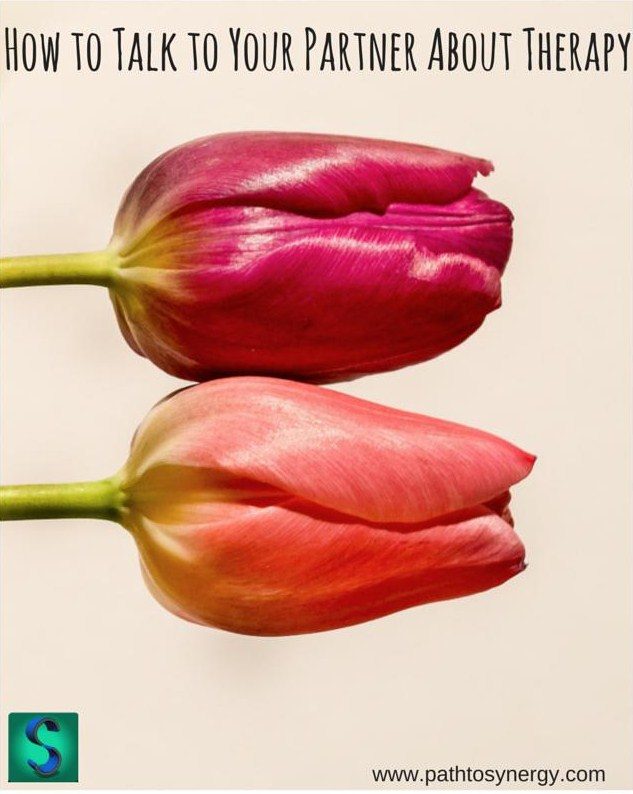How to Talk to Your Partner About Therapy
Having a conversation with your partner about therapy does not have to be a negative experience. Often times the thought of going to couples counseling can be overwhelming for people. While certainly there may be things in therapy that are uncomfortable or difficult to talk about, the end result people are looking for is always a positive change. Keeping the long term goal of therapy in mind may be an important factor when exploring when, or if to seek relationship help.
Here are some other strategies to keep in mind when considering how to talk to your partner about therapy.
Be honest
This seems obvious, right? Even though being honest may seem like it should go without saying, sometimes what we don’t say holds just as much information as what we do say. Being honest with your partner about what your concerns are as well as what your hope is for the future, can be a great place to start.
Therapy is not a last resort
Viewing therapy as a last resort is a sentiment I’ve heard often…..and even felt in my own life to be honest. However, I think looking at therapy as a last resort option, sets us up for trouble. Imagine these two statements –
- “I don’t know what else to do; I guess we’ll have to go to therapy to figure it out.”
- “We’ve tried some things so far and are still struggling, why don’t we try therapy and if that doesn’t help we’ll figure it out another way.”
Now based on the feelings from these two statements, which one would you say has a better chance of moving towards change? I hope you said statement number two. My point is that our intentions that we set prior to entering therapy can have an impact on outcome.
Make it about you
Remember that your partner will probably not be convinced to go see a therapist if they think that you want to fix them or that it is their issues that need to be addressed. So instead, make it about you. Exploring ways you think seeing a therapist may be helpful for you will open up an invitation to your partner, rather than putting them on the defensive.
Make it about the partnership
I know, I know, I just said something else right? The truth is that you can do both. It can be helpful to speak about where we are coming from and our own needs rather than exploring how we can change someone else. In addition, it’s helpful to set the intention that therapy is ultimately about how to make the partnership happier, healthier and more fulfilling. So make it a collaboration.
To learn more about considerations to make before choosing a therapist, check this post out on “how to choose a therapist.”
If you can only remember one thing – remember this: You are learning to cope with something. Learning to cope with a loss, a disconnect, a sadness, an infidelity or perhaps a list of many other potential struggles. So, when approaching your partner, this acronym will help – COPE.
Calm
Open
Positive
Earnest
Calm – Approach your partner when you are both calm. Often times the discussion of possibly engaging in therapy may come up during a fight….this can be a hard time to have this discussion (or sometimes any discussion. Revisiting this when both people are calm and can talk about options with a clear head is very important.
Open – Remaining open to not only what may unfold in therapy, but also how your partner may responds is important. Remember that initial reactions may be off putting and that giving your partner time to process may be necessary. On the other hand, not assuming that they will be closed off to therapy is important too.
Positive – In the same vein of not assuming, setting an intention for a positive outcome is important. As you enter into any discussion with your partner, or anyone really, having a positive sense about it may help to set the tone for the conversation. I don’t mean to say that things will always be easy or go your way in the conversation, but remaining open to the idea that something positive can come from it regardless, can be an empowering perspective.
Earnest – Offering the most sincere explanation for how you’d like to work on the relationship is important. Honesty and authenticity is important, but remember, not at the cost of staying calm, open and positive. Keeping a balance between these ideas can be a helpful strategy.
Ultimately though, no one knows your relationship better than the two of you. Keep in mind that while you may be seeking some guidance, your own insight is so valuable! I’ll wrap up with this quote –
“Another reality about relationships is that they are never static. All of us experience changes in relationships but a few stop to analyze why a relationship gets better or worse.”
― Gary Chapman
Please feel free to reach out with questions.
All the best,
Michael




